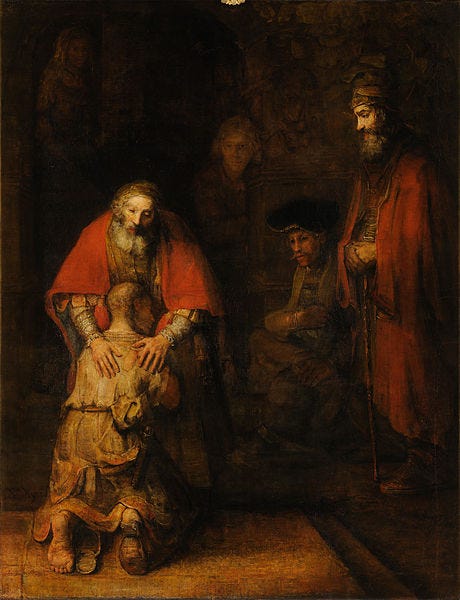A good friend of mine recently said about the Parable of the Prodigal Son, “I’ve heard a lot of sermons on that parable. It’s probably America’s best known parable.” And he’s right. Almost everyone knows it well. Preachers like to preach on it or at least to reference it occasionally. But I've noticed that many preachers misinterpret an aspect of the parable whenever they preach it.

When it is preached, some ministers –– especially Reformed preachers –– like to read too much into the distinction between the older brother and the younger brother. Contrasting the older brother’s response with the father’s response is part of what Jesus is wanting to do in the story. No doubt he also wants to contrast the reconciled and humbled younger brother with the proud and arrogant older brother. But some people talk about the younger brother as if he is humble and therefore the model for a child of God. And they’ll say that the older brother, because he was out of the celebration, is shown not to be loved or accepted by the Father. In other words, people who resemble the older brother are not Christians. The true Christians are the younger brother types. Tim Keller makes this point in The Prodigal God. He says:
"In Act 2, however, the focus is on the elder brother. He is fastidiously obedient to his father and, therefore, by analogy, to the commands of God. He is completely under control and quite self -disciplined. So we have two sons, one “bad” by conventional standards and one “good,” yet both are alienated from the father. The father has to go out and invite each of them to come into the feast of his love. So there is not just one lost son in this parable— there are two. But Act 2 comes to an unthinkable conclusion. Jesus the storyteller deliberately leaves the elder brother in his alienated state. The bad son enters the father’s feast but the good son will not. The lover of prostitutes is saved, but the man of moral rectitude is still lost. We can almost hear the Pharisees gasp as the story ends . It was the complete reversal of everything they had ever been taught. Jesus does not simply leave it at that. It gets even more shocking. Why doesn’t the elder brother go in? He himself gives the reason: “Because I’ve never disobeyed you.” The elder brother is not losing the father’s love in spite of his goodness, but because of it."
Timothy Keller, The Prodigal God (Kindle Locations 336-345)
But the older brother isn’t an example of an unconverted person who doesn’t understand the grace of God. That’s not the point the parable makes. Why? Because at the very end of the parable, when the older son is complaining to the father about the celebration for the younger brother, the father says: “‘My son,’ the father said, ‘you are always with me, and everything I have is yours. But we had to celebrate and be glad, because this brother of yours was dead and is alive again; he was lost and is found.’” (Luke 15:31-32 NIV) Yes, the older brother is left out of the celebration for the younger brother. And, yes, Jesus wants to show the Pharisees that the way they relate to the sinners and outcasts is out of line with the very nature of God. But Jesus has the father affirm that the older brother is still with the father and still has “everything” the father has. This is important for two reasons: first, it is always an important matter to come to a clearer understanding of the Word of God; second, the parable shows that God’s grace –– imaged in the actions of the father –– embraces both the returning sinner and the proud religious person. Some preachers talk as if legalism is the unforgivable sin. Paul definitely has some harsh language for the opponents he’s writing against in Galatians. (We have to be careful, though, not to mischaracterize Paul’s opponents in Galatia as legalists in the traditional sense. The situation there was more complicated.) But the Parable of the Prodigal Son shows God’s grace for the broken sinner and the proud religious person. Let’s not lose sight of that in our desire to preach against legalism.




Good stuff. I would make a couple of observations.
The older bro is not left out, but we are left hanging. Does, or doesn't he go in? Doesn't say. The people are left hanging to choose who are they going to be? How will they handle the gift (Jesus), or the inheritance of eternal life? What will they do with Jesus? Squander him, whoring after other Gods as they did when they were the prodigal Israel taken to Babylon?
Then there is a literary undertone of this text to Exodus 32. God said to Moses, "your people" whom you brought out of Egypt. God is going to bring justice. The "teachers" know these undertones and Jesus is setting them up. Moses in Exodus 32 responds to God "your people" you brought out of Egypt. Moses is the Christ like Messiah, Deliver, Pleasing, Meek, standing in the gap. The Older bro says, "This son of yours", making a statement of "justice" to the father, in "anger" about this scandal. Jesus flipped the script. The Father says back, "this brother of yours", received grace, and needs to make a choice to join the family. Remember, the older son compared his keeping his father's commands as a chattel "slave" would do, and not even a “hired hand”, and an indentured servant, as the younger bro did. Jesus's undertones in this story scream very loud to the Jews and leaders who are listening, that we don't catch in our culture.
PS, I’m a Wesleyan pastor and not in the Reformed camp.